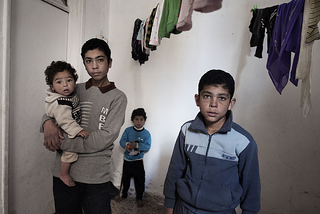
Caritas helps Syrian child refugees in Zarka, a town north-east of Amman in Jordan. Photo by Alessio Romenzi/Caritas Switzerland
In some parts of the world, war, violence, poverty and abuse mean that children aren’t safe in their homes. Many of them leave, either with their parents or alone, in hope of finding a place to live which is safer and where they can flourish.
Migrant children, especially those who are unaccompanied, are vulnerable to abuse. It is essential that the international community ensures the protection of these children. Caritas supports the Convention on the Rights of the Child which is a key treaty for ensuring the rights of children across the world.
- What is the Convention on the Rights of the Child?
The Convention on the Rights of the Child is the most widely ratified human rights treaty in history. It protects the rights of people under 18 everywhere. This includes the right to protection, to healthcare and adequate nutritious food, and the right for children to express themselves – among other things. The convention was adopted by the United Nations on 20 November 1989.
- Why does Caritas support it?
Caritas believes children should be protected and nurtured. The convention lays the foundation for protecting children from abuses to their rights. Caritas believes that the establishment and protection of human rights is key to promoting human dignity. The integral development of the person is at the centre of Caritas work. Respect for people’s dignity is the cornerstone of this.
Caritas runs projects which promote the rights of children, for example: school feeding programmes which ensure they have nutritious food to eat, education for children who would be out of school and it creates safe areas in which migrant and refugee children can play. Caritas supports the End Immigration Detention of Children campaign which aims to raise awareness about the terrible effects of locking up migrant children.
- Which countries have ratified it?
Over 190 countries have ratified the convention. Only two countries haven’t ratified the treaty – Somalia and the United States of America. Somalia hasn’t had the governmental capacity to ratify treaties and the United States signed the convention but need time to examine federal and state law before ratifying such a treaty.
- Does ratification mean that children’s rights are protected in these countries?
The road from ratifying a convention to integrating it into national legislation and ensuring that people have access to justice through these laws is a long one. The convention is a good basis to protect the rights of children but national legislation should reflect all its principals and should be implemented to protect all children, including those who are migrants.
